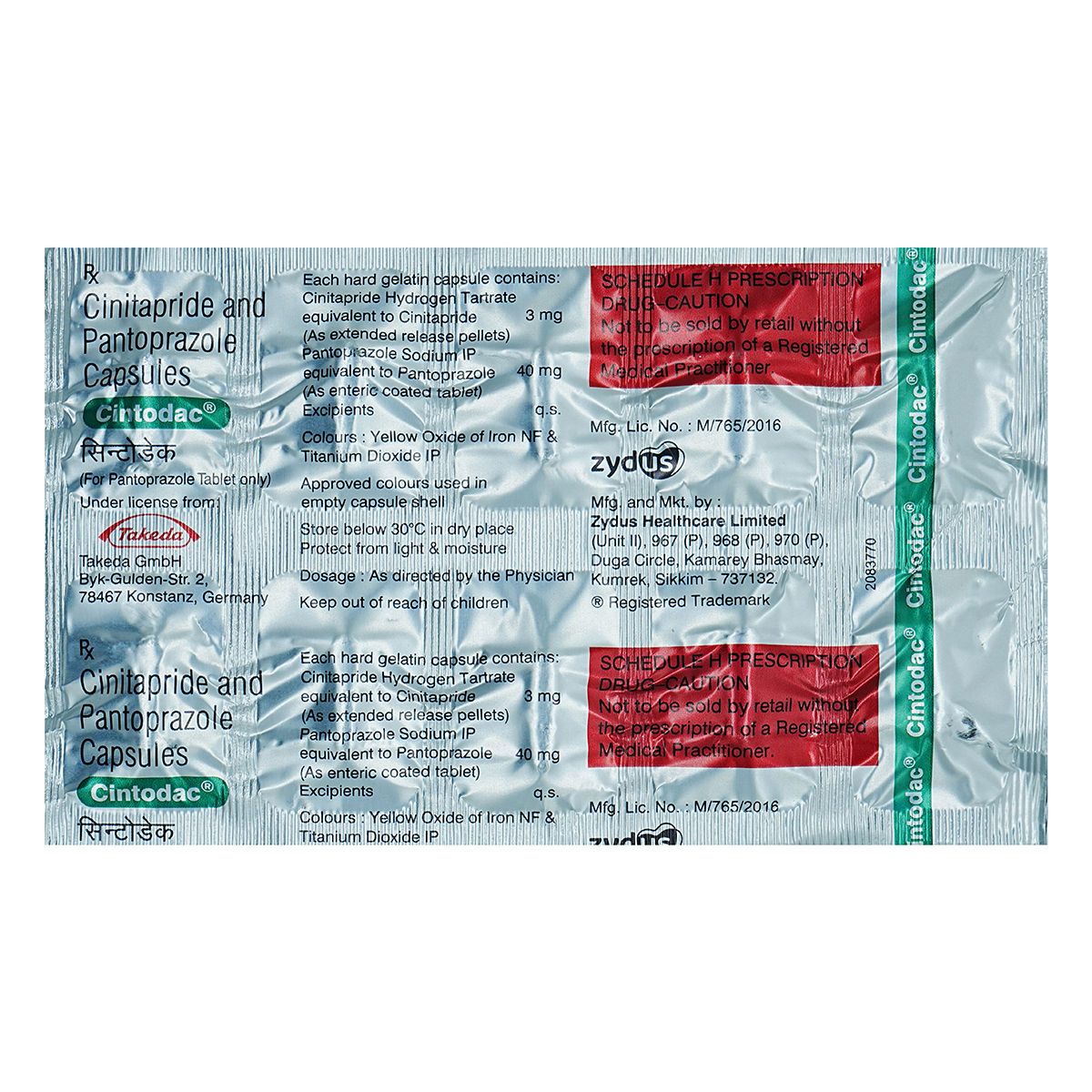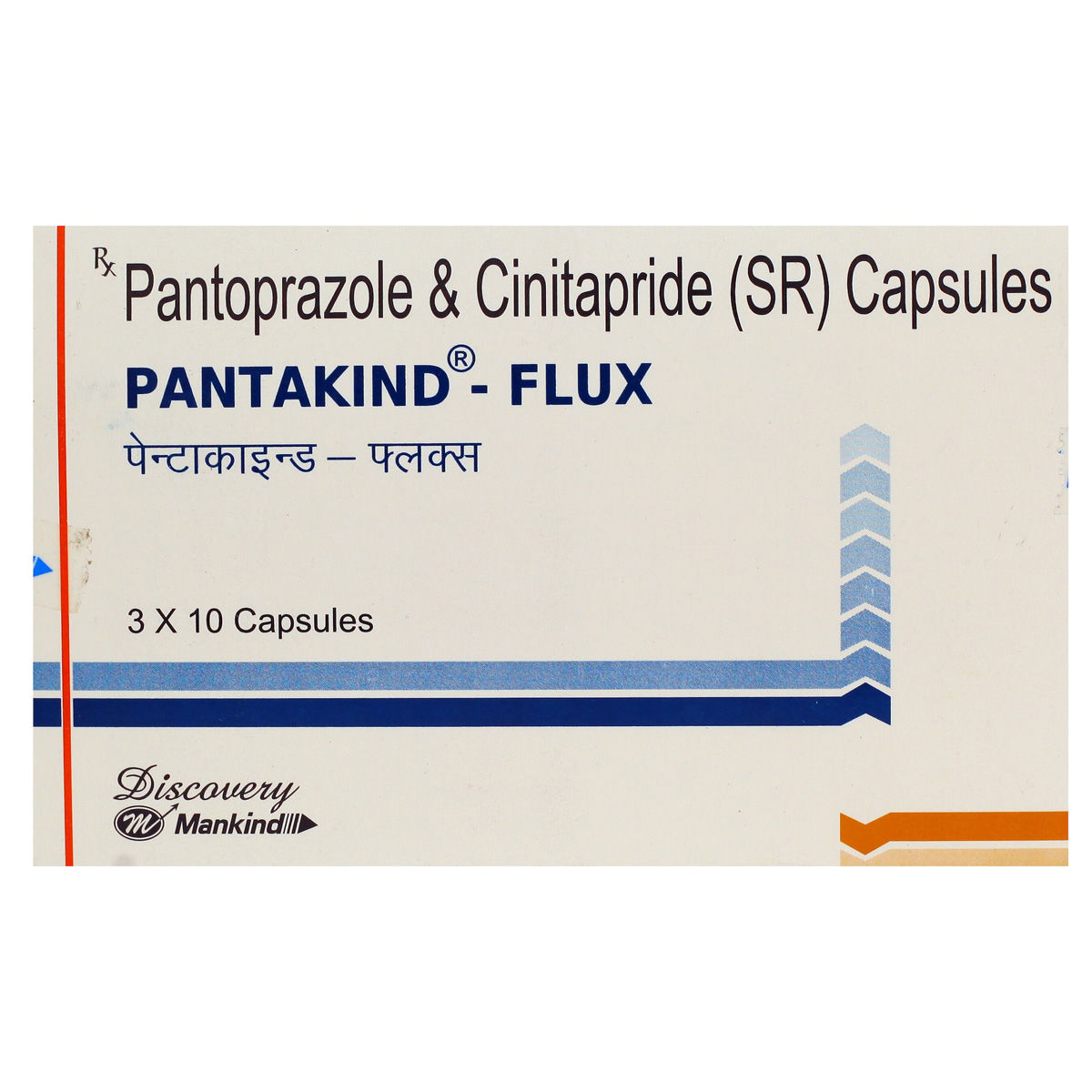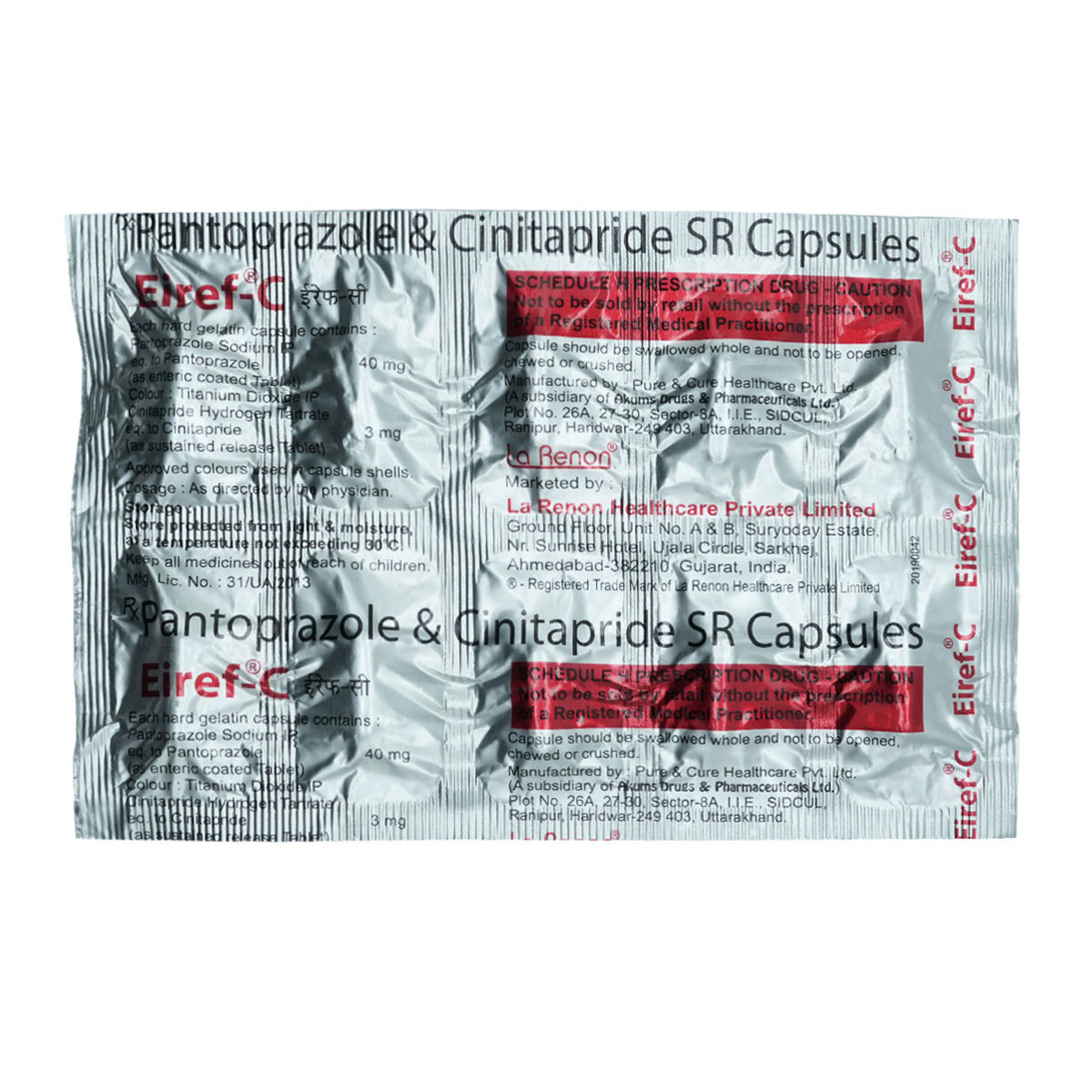Pantoprazole+cinitapride
About Pantoprazole+cinitapride
Cinitapride+pantoprazole is a combination medication used to treat gastro-oesophageal reflux disease (GERD), indigestion, duodenal ulcers, erosive oesophagitis (acid-related damage to the lining of the oesophagus), infections caused by Helicobacter pylori when given along with an antibiotic, and Zollinger-Ellison syndrome. The stomach is usually protected from acid by a mucous layer. In some cases, due to excess acid production, the mucous layer gets eroded, which leads to complications like GERD, acidity, and peptic ulcers.
Cinitapride+pantoprazole contains Pantoprazole and Cinitapride. Pantoprazole works by blocking the action of an enzyme called gastric proton pump, which is responsible for the production of stomach acid. Cinitapride increases the pressure of the inferior oesophageal sphincter, thereby preventing the back-flow of food and acid from the stomach into the mouth. Together, Cinitapride+pantoprazole helps in preventing acid reflux, thereby providing relief from acidity and heartburn.
You are advised to take Cinitapride+pantoprazole for as long as your doctor has prescribed it for you, depending on your medical condition. In some cases, you may experience certain common side effects, such as headache, flatulence, stomach pain, constipation, and diarrhoea. Most of these side effects do not require medical attention and will resolve gradually over time. However, you are advised to talk to your doctor if you experience these side effects persistently.
Consult your doctor if you are pregnant or breastfeeding. Cinitapride+pantoprazole may cause dizziness, so drive only if you are alert. Cinitapride+pantoprazole should not be given to children as safety has not been established. Avoid consuming alcohol along with Cinitapride+pantoprazole as it could lead to increased drowsiness and can elevate the production of stomach acid. Keep your doctor informed about all the medicines and your health condition to rule out any side effects.
Uses of Pantoprazole+cinitapride
Medicinal Benefits
Cinitapride+pantoprazole is a combination medicine used to treat gastro-oesophageal reflux disease (GERD), indigestion, duodenal ulcers, erosive oesophagitis (acid-related damage to the lining of the oesophagus), infections caused by Helicobacter pylori when given along with an antibiotic, and Zollinger-Ellison syndrome. Cinitapride+pantoprazole is a combination of two drugs: Pantoprazole and Cinitapride. Pantoprazole is a proton pump inhibitor that works by blocking the action of an enzyme called the gastric proton pump, which is responsible for the production of acid. Cinitapride is a gastro-prokinetic agent which increases the pressure of the inferior oesophageal sphincter, thereby preventing the back-flow of food and acid from the stomach into the mouth. Together, Cinitapride+pantoprazole helps in preventing acid reflux, thereby providing relief from acidity. Cinitapride+pantoprazole increases gastrointestinal motility by enhancing the strength of contractions without disrupting their rhythm; thus, it helps treat indigestion.
Directions for Use
Storage
Side Effects of Pantoprazole+cinitapride
- Headache
- Flatulence
- Stomach pain
- Constipation
- Diarrhoea
Drug Warnings
Do not take Cinitapride+pantoprazole if you are allergic to any of its contents. Inform your doctor before taking Cinitapride+pantoprazole if you have severe liver or kidney problems and if you are due to have a Chromogranin A test. Consult your doctor if you experience unexplained weight loss, stomach pain, indigestion, vomit food or blood, or if you pass black stools. On long-term treatment, Cinitapride+pantoprazole may cause osteoporosis and hypomagnesemia (low levels of magnesium) and may reduce the absorption of vitamin B12. Consult your doctor if you are pregnant or breastfeeding. Cinitapride+pantoprazole may cause dizziness, so drive only if you are alert. Cinitapride+pantoprazole should not be given to children as safety has not been established. Avoid consuming alcohol along with Cinitapride+pantoprazole as it could lead to increased drowsiness and can elevate the production of stomach acid. Keep your doctor informed about all the medicines and your health condition to rule out any side effects.
Drug Interactions
Drug-Drug Interactions: Cinitapride+pantoprazole may interact with pain killers (aspirin, naproxen), an antidepressant (duloxetine), hormone (levothyroxine), statins (atorvastatin), blood thinner (clopidogrel), vitamin (cyanocobalamin), a drug used to treat motion sickness (phenothiazine), cardiac glycoside (digoxin), anti-dopaminergic drugs (used to treat schizophrenia), anticholinergic drugs (used to treat overactive bladder and COPD) and opioid analgesics (used to relieve pain).
Drug-Food Interactions: Avoid smoking and alcohol consumption. Alcohol intake leads to increased production of stomach acid, thereby increasing acidity and heartburn.
Drug-Disease Interactions: Inform your doctor if you have gastrointestinal bleeding, mechanical obstruction or perforation, Clostridium difficile-associated diarrhoea (CDAD), liver disease, bone fractures, or hypomagnesemia (low magnesium levels).
Drug-Drug Interactions Checker List:
Safety Advice

Alcohol
unsafeAvoid consumption of alcohol while taking Cinitapride+pantoprazole. Alcohol intake leads to increased production of stomach acid, thereby increasing acidity and heartburn.

Pregnancy
cautionConsult your doctor before taking Cinitapride+pantoprazole if you are pregnant; your doctor will prescribe only if the benefits outweigh the risks.

Breast Feeding
cautionConsult your doctor before taking Cinitapride+pantoprazole if you are breastfeeding; your doctor will decide whether breastfeeding mothers can take Cinitapride+pantoprazole or not.

Driving
cautionCinitapride+pantoprazole may cause dizziness. Do not drive or operate machinery unless you are alert.

Liver
cautionDose adjustment may be needed. Consult your doctor before taking Cinitapride+pantoprazole if you have a liver impairment or any concerns regarding this.

Kidney
cautionDose adjustment may be needed. Consult your doctor before taking Cinitapride+pantoprazole if you have kidney impairment or any concerns regarding this.

Children
unsafeCinitapride+pantoprazole should not be given to children as safety and effectiveness were not established.
Habit Forming
Diet & Lifestyle Advise
- Eat smaller meals more often.
- Avoid smoking and alcohol consumption. Alcohol intake leads to increased production of stomach acid, thereby increasing acidity and heartburn.
- Maintain a healthy weight by regular exercising.
- Avoid lying down after eating to prevent acid reflux.
- Avoid tight-fitting clothes as it might increase the pressure on the abdomen, leading to acid reflux.
- Practise relaxation techniques and avoid stress by doing yoga or meditation.
- Avoid foods such as high-fat, spicy food, chocolates, citrus fruits, pineapple, tomato, onion, garlic, tea, and soda.
- Avoid sitting continuously, as it may trigger acidity. Take a 5-minute break every hour by brisk walking or stretching.
Special Advise
- Inform your doctor before taking Cinitapride+pantoprazole if you are due to have a Chromogranin A test.
- Regular monitoring of magnesium and vitamin B12 levels is advised if you are on long-term treatment with Cinitapride+pantoprazole.
- Your doctor may recommend calcium and vitamin supplements if you are on long-term treatment with Cinitapride+pantoprazole.
Patients Concern
Disease/Condition Glossary
Gastroesophageal reflux disease (GERD): Gastroesophageal reflux disease (GERD) occurs when stomach acid frequently flows back into the food pipe (oesophagus). This backflow (acid reflux) irritates the food pipe and causes heartburn. Symptoms include heartburn, sour or bitter taste in the mouth, and difficulty swallowing.
Peptic ulcers: Peptic ulcers are sores that develop on the lining of the stomach and intestine due to erosion of the stomach's protective lining. Symptoms include nausea, changes in appetite, bloody or dark stools, unexplained weight loss, vomiting, and indigestion.
Indigestion: Indigestion is the feeling of fullness. It occurs due to slow gastric emptying. Symptoms include stomach pain, bloating, heartburn, nausea and vomiting.
Zollinger Ellison syndrome: It is a rare condition in which a gastrin-secreting tumour of the pancreas causes excessive acid production, leading to peptic ulcers.
FAQs
Cinitapride+pantoprazole treats Gastro-oesophageal reflux disease (GERD), Zollinger-Ellison disease, and Heartburn.
Cinitapride+pantoprazole contains Pantoprazole and Cinitapride. Pantoprazole works by blocking the action of an enzyme called gastric proton pump, which is responsible for the production of stomach acid. Cinitapride increases the pressure of the inferior oesophageal sphincter, thereby preventing the back-flow of food and acid from the stomach into the mouth. Together, Cinitapride+pantoprazole helps in preventing acid reflux, thereby providing relief from acidity and heartburn.
Diarrhoea might be a side-effect of Cinitapride+pantoprazole. Drink enough fluids and eat non-spicy food if you experience diarrhoea. If you find blood in stools (tarry stools) or if you experience severe diarrhoea, consult your doctor. Do not take anti-diarrheal medicine on your own.
Avoid lying down immediately after meals to prevent symptoms of acid reflux. After having a meal, try 10-15 minutes of brisk walking, especially after dinner. Raise the head of the bed 10-20 cm by putting a pillow so that the head and chest are above the waist. This helps prevent acid reflux.
Cinitapride+pantoprazole contains pantoprazole, which might increase the risk of bone fracture in the hip, spine, or wrist due to the decreased magnesium level in bones. This mainly occurs in people taking higher doses of Cinitapride+pantoprazole for longer durations. Inform your doctor before taking Cinitapride+pantoprazole if you have osteoporosis or if you are taking corticosteroids.
Dry mouth could be a side effect of Cinitapride+pantoprazole. Limiting caffeine intake, avoiding smoking and mouthwashes containing alcohol, drinking water regularly, and chewing sugar-free gum/candy might help stimulate saliva and thereby prevent dry mouth.
Depending on your medical condition, you are advised to take Cinitapride+pantoprazole for as long as your doctor has prescribed it. If you face any difficulty while taking it, stop using it and consult the doctor.
No, Cinitapride+pantoprazole is not an antibiotic medication.
Yes, it can be taken as an empty stomach.
Cinitapride+pantoprazole contains Cinitapride And Pantoprazole.
Common side effects of Cinitapride+pantoprazole may include headache, flatulence, stomach pain, constipation, and diarrhoea.
No, it is used to treat gastro-oesophageal reflux disease (GERD), Zollinger-Ellison disease, and Heartburn.






